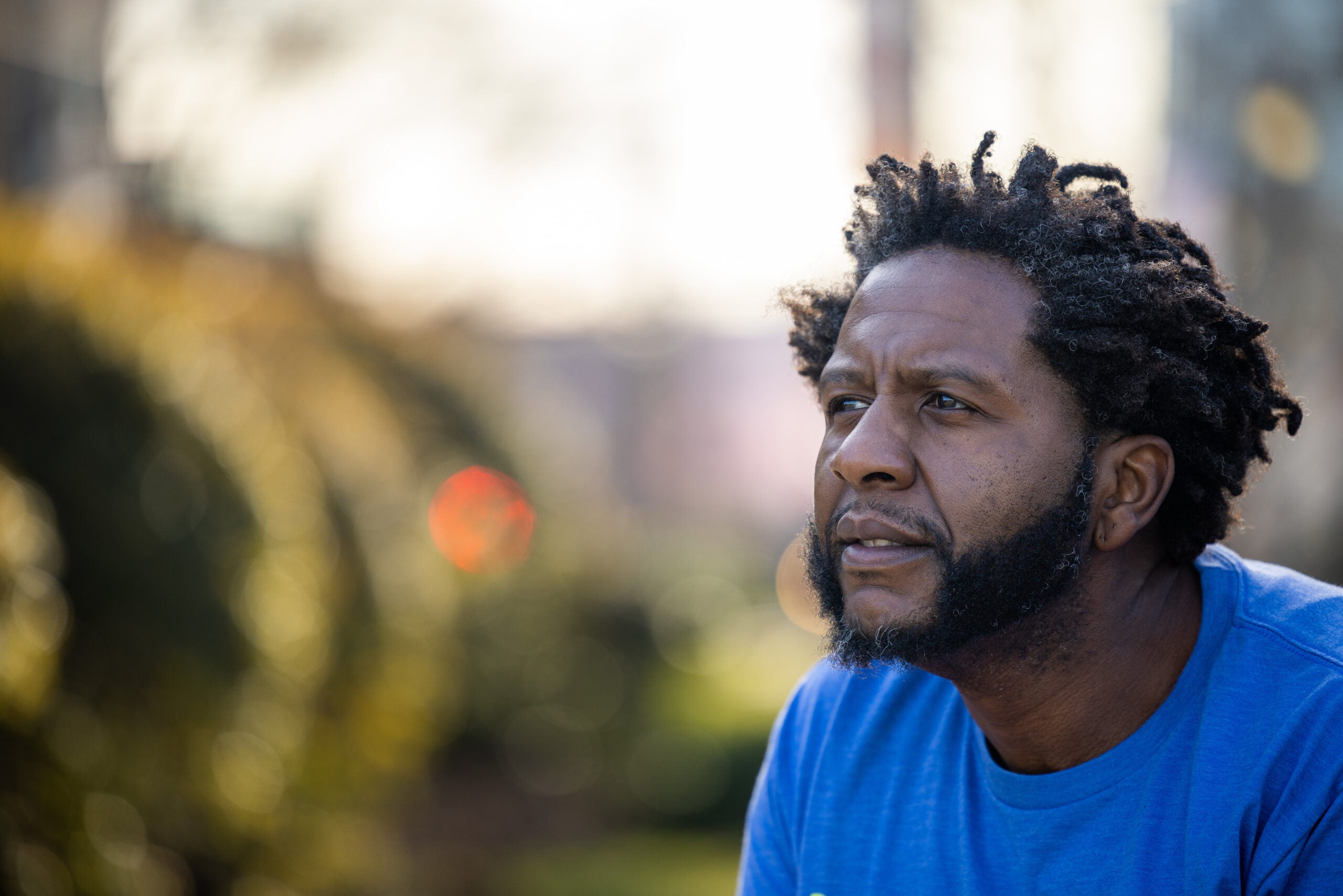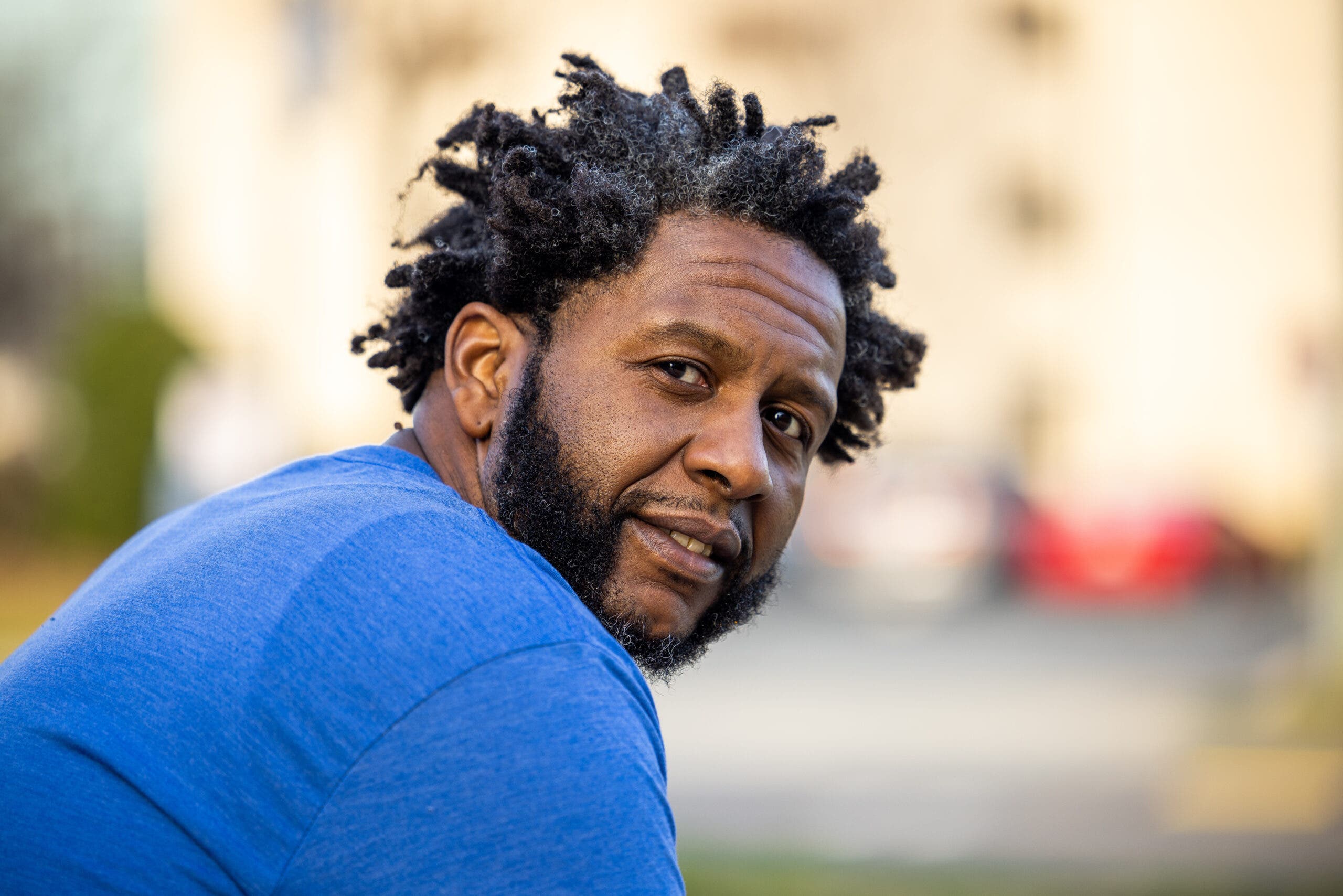John Gerst’s Body Almost Killed Him

(Photo: Peter Taylor for Triathlete)
John Gerst was sitting in a brightly lit physician’s office, having come in for a fairly routine sinus infection, when his world went dark.
“We need to talk about your weight,” the doctor said sternly, eyeing Gerst’s chart. Just minutes before, as he was being checked in, the then 38-year-old finance manager from Charlotte, NC, had stepped on the scale and saw the number 352 pop up. Standing 5 feet, 9 inches, Gerst had always been a bigger guy. He wrestled as a 250-pound heavyweight in high school and put on more in college—thanks to a routine diet of pizza and beer. He’d gone up and down since, and, as life got more and more busy with marriage and a kid, he hadn’t weighed himself in a while. He figured he’d gained weight—but not that much.
Gerst tried to follow the doctor as the words like morbidly obese and diabetes and gastric bypass surgery tumbled out of the doctor’s mouth. As he walked out of that office, a referral to a weight-loss specialist in his hand, he thought about his future. And the possibility of not being able to chase his son Charles around the playground or on a ball field. Or that he’d even be around to see him grow up. With the doctor’s ominous message ringing in his ears, Gerst knew had to do something.
The reality
Gerst’s doctor was far from being alarmist: A 2014 collection of studies published in the journal PLoS Med showed that on average people with a body mass index (BMI) over 40 have a lifespan over six years shorter than their peers. It also showed men were at a higher risk than women. At his height and weight, a rough calculation of Gerst’s BMI at that visit would put him at 52—well above that deadly ceiling and even riskier as a man. That same study indicated that those with a BMI over 55 reduced their life span by 14 years; Gerst was literally teetering on a dangerous precipice of risk.
A running start
And so, Gerst’s road back to life began. His first steps were as a runner, joining the local chapter of Black Men Run, a nationwide organization aimed at increasing fitness among African-American males, after that fateful doctor’s appointment. More specifically, he began as a walker, slowly introducing short bursts of running into his workouts until he had progressed to a 5K, then a 10K, then longer. He gave up the pizza, the Oreos, the fast food.
And as he lost weight, he gained an entire community of new friends and running buddies. He became a fan-favorite at local races, known around the area as the guy who could cut the tension at the starting line with a joke or a dose of positivity, drawing others in with his broad smile and larger-than-life personality.
Gerst loved being “just” a runner. But he also had a swimming background, and occasionally, he’d log laps at his local pool. Some of his running buddies had done triathlons, and Gerst became intrigued—and, ultimately, influenced.
“If you hang with everyone who does something, eventually, you’re going to do something, too,” Gerst says of his fit friends. “I call those guys my ‘tri-bullies.’ They can convince me to do just about anything.”
Nevermind that he was still considered overweight. Nevermind that he didn’t even own a bike, or that he had a serious fear of open-water swimming. The idea of completing three sports in one day fascinated and ignited a spark in Gerst that ultimately took him from obese and unfit to Ironman.
A long and winding road
After buying a road bike from his friend, and immersing himself in the local tri community (who embraced him full-tilt), Gerst completed his first triathlon, a sprint in Atlanta. He caught the bug, progressing from sprints to Olympics and even a couple of 70.3s. But one larger-than-life dream remained firmly hanging over his head: The Ironman.
The seed was originally planted in his head by Jeremy Walton, a Masters swim coach at the Brace Family YMCA in Matthews, North Carolina. Gerst clicked with Walton during swim sessions, and they often talked about big, audacious goals. Walton told Gerst he was capable of finishing an Ironman. Gerst laughed it off at first, but then he began to believe, too. And he wanted his coach, who also has his own triathlon coaching business, to get him there. So, in 2019, the pair reached an agreement that they’d work together towards Ironman, but not right away. It would be a two-year journey.
“I wanted to meet John where he was, and give him time to build a solid base to avoid injury and gradually get him used to all that comes along with such intense training,” Walton says. “Ironman is a huge undertaking, not only physically, but also it makes such an impact on your lifestyle. He needed time to steadily increase his training to get him ready for that distance.”
The teased-out training plan is a novel approach, as typical triathlon programs promise to get you race-ready in anywhere from six to 18 months. Besides, it can be tough to keep up morale and motivation while training for one big event over such an extended amount of time. But Gerst rose to the challenge. Under Walton’s tutelage, he targeted Ironman Chattanooga in 2021 and steadily increased his mileage in the pool, on the bike, and on the run, while continuing to fine-tune his diet to ensure his body was up for the strain of 15-to 20-hour training weeks.
The two-year timeframe also allowed for Gerst’s wife, Denise, to wrap her head around the idea and the time he’d have to spend out of the house to train—although she saw Ironman coming perhaps even before her husband did.
“You don’t stay married for 20-plus years to someone and not know what to anticipate. As soon as he started doing sprint and Olympic triathlons, I knew he’d be up to something bigger,” Denise says. “That’s just his personality: When he commits to something, whether it’s his career or his family or triathlon, he goes big. He’s all in.”
Checking the boxes
The two years that Gerst spent training for Ironman Chattanooga wasn’t without its benchmarks. To break up the monotony of workouts, he continued to race in his local tris, while crossing-off a few milestones along the way.
“I know it goes against a lot of conventional wisdom, but I really wanted to complete close to the length of each leg of the Ironman in a race setting,” Gerst says. “So I found a 2-mile open-water swim, which I finished. I raced a century ride. I did the Kiawah marathon in South Carolina. Once I got all of those under my belt, along with the regular Ironman training, I felt like I could put it all together when race day came.”
A change for good
Early in the morning of September 21, 2021, Gerst stood on the banks of the Tennessee River as a changed man. He was some 110 pounds lighter than he was when his fitness journey began, and down about 14 sizes in pants. But he was admittedly a better person as a whole. The emotional enormity of his transition took hold the minute Gerst stepped into Ironman Village to pick up his packet, and continued until race morning as he replayed the previous years and all he had gone through in his mind.
He was no longer the unhealthy father who couldn’t chase after his kid. He was the cool dad who could run, bike, and swim seemingly forever, eventually inspiring his son, now 14, to take up swimming and compete for his high school team—recently qualifying for the State Championships. The two even share a lane from time to time, knocking out laps together.
He was no longer a source of endless worry for Denise, who quietly feared she’d lose him young due to his health. He was now her biggest cheerleader, supporting her on her own endurance journey to completing two marathons.

He was their hero.
Gerst’s race in Chattanooga was not perfect. He came close to missing the cut-off time on the bike, and he had some very tough, lonely moments during the two-loop run course, as the sun slipped behind the horizon and darkness enveloped him.
“When I finished my first loop and could hear the finish line with people’s names being called, yet I still had 13.1 miles to go…that was cruel,” Gerst says. “But I was also prepared for it. As I rounded the corner for that second loop, I shouted, ‘Keep the party going until I get back.’”
The party was still rocking when Gerst finished the race in 15:53:27. He unleashed a guttural scream as he crossed the line, tears streaming down his face.
“Two years worth of work, I did it,” he recalls. “What an unbelievable moment.”
Embracing his community
Since Chattanooga, Gerst entered Ironman Cozumel this past November, but, overheated and dehydrated, he passed out on the run and did not finish. While a tough setback, Gerst remains steadfast in his dedication not only to get more out of himself as a triathlete (he’s eyeing Ironman New York 70.3 this summer), but to become even more invested in the community that lifted him up and helped him achieve his wildest dream. Those who stuck by his side during his very first swims in a nearby lake, promising that they’d never let him drown, and allowing him to overcome his fear of open water.
Those who met him in dark parking lots at 4 a.m. so he could have some company on his 100-mile rides, which would take over eight hours to complete. Those who showed up to his shorter races along the way to his Ironman, to greet him at the finish line with hugs and high fives.

“This community is contagious. I love them. I’ve had so many people who have given to me along the way, and they’ll show up for me no matter what,” Gerst says. “So if it’s time for me to show up with the cowbell and cheer them on, I’ll do that.”
One of Gerst’s training partners, Marshall Miles, a Charlotte resident and five-time Ironman finisher, has watched his friend’s evolution from the start—as well as the impact he’s made on those around him.
“It’s funny, I helped John get into triathlon, but now he’s the one inspiring me,” says Miles, one of the “tri-bullies” Gerst spoke of. “The confidence he’s gained and the effect he’s had on others who follow his path is incredible. He’s a beacon to a lot of people.”